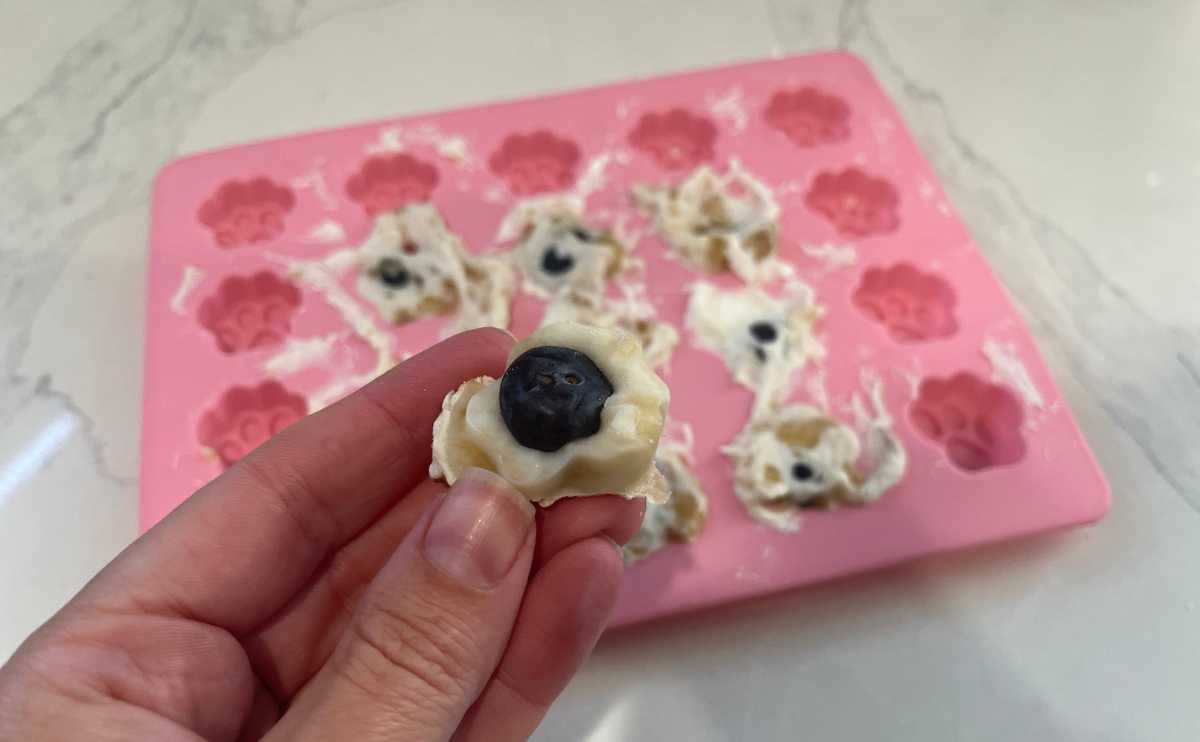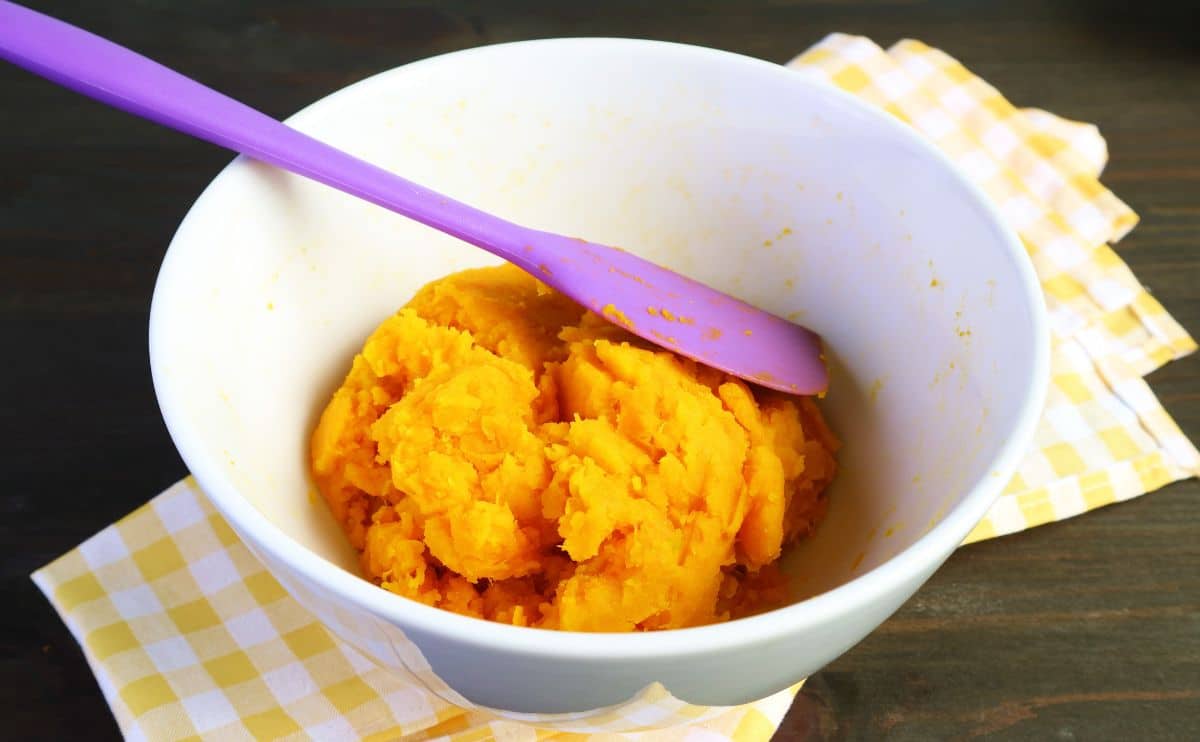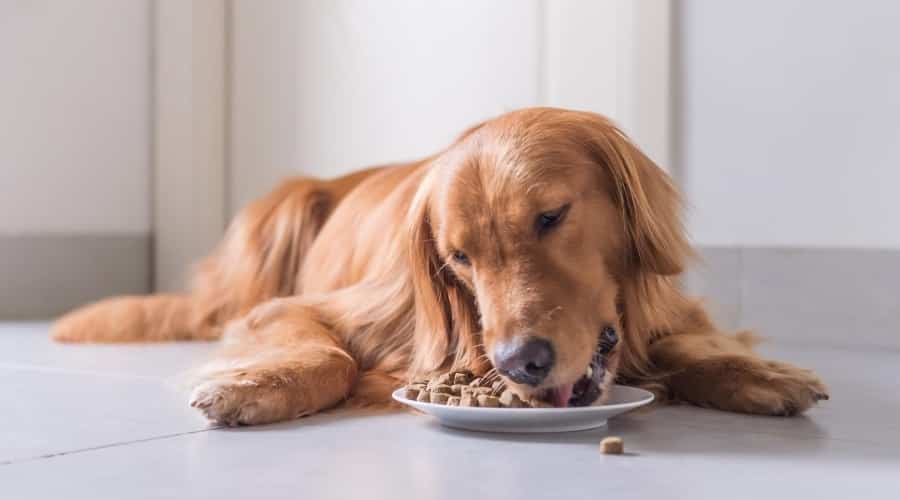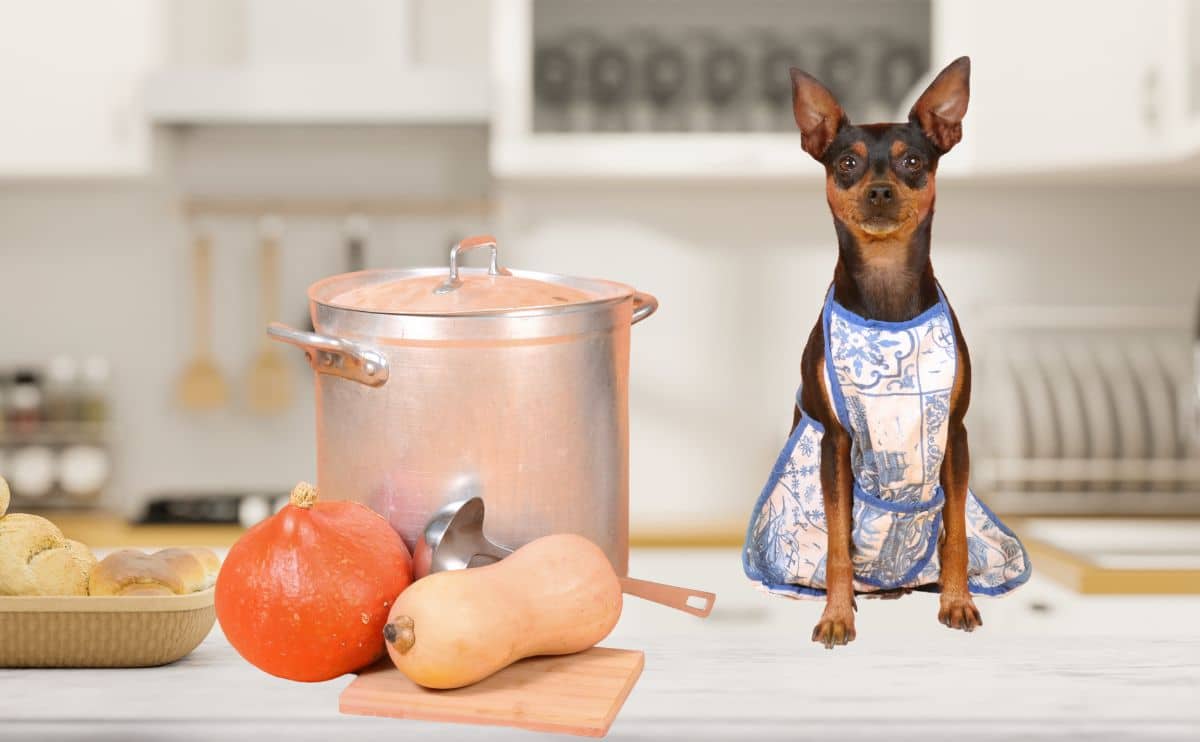French Bulldog Feeding Chart: How Much To Feed Your Frenchie Puppy Nutritional Tips And Care
When you purchase through links on our site, we may earn a commission. Here’s how it works.
Congratulations, you just brought home an adorable new French Bulldog puppy. There are a lot of different aspects of caring for your new puppy. One of the most critical parts of canine care is nutrition. This is a significant factor in the lifelong health and proper growth and development of every canine breed. Frenchies are a hugely popular breed. These friendly, adorable pups just melt the hearts of those they meet.
Table of Contents
Knowing what to feed a French Bulldog puppy from the day she comes home with you until her days as a senior dog is a big task. Her nutritional needs will change as she ages and through different biological phases. Males and females will grow at different rates, and males may eat more than females due to their larger size.
New puppy owners have lots of questions about feeding. How much should I feed my French Bulldog? What kind of dog food is best? When can my puppy switch to adult food? We’ll focus on answering these questions and more in our comprehensive French Bulldog feeding guide.
| Age | Type Of Food | Amount | Meals A Day |
|---|---|---|---|
| 1 to 2 weeks | Mother's milk | unlimited | unlimited |
| 3 weeks | Mother's milk | unlimited | unlimited |
| 4 weeks | Mother's milk and mush | 1/4 cup mush | 6 |
| 5 weeks | Puppy food | 1/2 cup to 1 cup | 4 - 6 |
| 6 weeks | Puppy food | 1 cup | 4 |
| 7 weeks | Puppy food | 1 cup | 4 |
| 8 weeks | Puppy food | 1 1/2 cup | 4 |
| 9 weeks | Puppy food | 1 1/2 cup | 3 - 4 |
| 10 weeks | Puppy food | 1 1/2 cup | 3 |
| 11 weeks | Puppy food | 1 1/2 cup | 3 |
| 12 weeks | Puppy food | 1 1/2 cup | 3 |
| 6 Months | Puppy food | 2 cups | 2 -3 |
| 9 months | Puppy food/adult food | 2 - 21/2 cups | 2 |
| 1 year | Adult food | 2 -3 cups | 2 |
| Adult | Adult food | 2 - 3 cups | 2 |
| Senior | Adult food | 2 - 3 cups | 2 |
How Much Should A French Bulldog Puppy Eat?
French Bulldogs need a well-balanced diet. When they are first born, puppies rely on their mother’s milk or a formula substitute. Newborn puppies should not be fed solid dog food for several weeks. Remember, every dog is different, but you can follow these general guidelines for feeding your French Bulldog puppy.
Weeks 1-2
French Bulldog puppies are born helpless and cannot see or hear yet. They weigh between one and two pounds. They need to stay close to their mom and will nurse as needed. It may be hard to monitor how much milk each puppy is getting. Puppies should be allowed to nurse as much as they want to. If any seem like they are not getting enough sustenance, check with your veterinarian for our recommendation of a replacement puppy formula. Their mother’s milk is best, as it is full of colostrum, a substance high in antibodies, minerals, and other vital growth factors. Colostrum is custom-created by mother dogs for their puppies, and there is no equitable replacement out there.
Week 3
For the third week of life, Frenchie puppies will be able to see and hear and will start to make puppy noises. They will begin to fill out in weight and will want to eat several times a day. Puppies this small will still want to nurse about every four hours. They will start to discover their feet and will have small bouts of high energy. However, they will still spend most of their time nursing and sleeping. French Bulldog puppies will need to start weaning from their mothers around three or four weeks.
Week 4
At four weeks old, a French Bulldog puppy will still want to nurse from her mother several times a day. She is ready to start drinking water from a bowl around this time if she has not already. Around this time, try introducing them to a mushy mixture of food and water. A high-quality puppy formulated kibble soaked in water until it falls apart or wet puppy food mixed with a lot of water can be offered a couple of times a day. This mixture should be mainly water, with at least three parts of water for one part of the food. Do not be alarmed if your puppy is not interested in this puppy food mush mixture just yet. Her mother’s milk will still provide her with everything she needs.
Some breeders choose to feed puppies a mixture of raw meat and water instead of using puppy food to make this mushy puppy mixture. If you are interested in feeding your Frenchie raw meat, check with your veterinarian before you do.
Week 5
By week 5, your puppy will be steady on her feet and ready to explore. She will still want her nurse from mom but should show a little more interest in the puppy food water mixture you offer her. Offer the mix a few times a day, but do not force her to eat it. If she has not yet been introduced to solid puppy food, it is best to start now. Mother dogs can only nurse puppies for a limited time, as it is quite taxing and exhausting on their bodies.
Week 6
French Bulldog puppies are quite lively by six weeks old and are starting to understand their surroundings. They should be eating solid food and will have teeth growing in. Feeding them kibble now provides them with the nutrition they need to grow and gives those painful new teeth some relief. By six weeks, puppies should be weaned from mom. The mother dog will be ready to be done with nursing by now, and she may force nursing to stop.
Week 7
Seven-week-old puppies should visit the vet if they have not already. They will be eating puppy food. Kibble is an excellent choice, and owners can offer wet food throughout the day if they like. Puppies will be eating multiple meals a day. Puppies exert a lot of energy and need regular replenishing. Every 8 hours is an excellent way to distribute food.
Week 8
At eight weeks old, Frenchie puppies should be eating about a cup and a half of food a day. This should be divided into four meals. This may not seem like a lot of food. However, it is extremely easy for this breed to overfeed. Obesity is a big problem for smaller frame dogs like the French Bulldog, as it can put excess pressure on their frames and body systems.
If your puppy seems like she is not getting enough food, you can offer her treats periodically throughout the day. If you have concerns about her growth and appetite, it is best to consult your veterinarian for advice and rule out any underlying medical issues. Puppies should be well into receiving their initial puppy shots and are ready to go to new homes at around eight or nine weeks of age.
Week 9
Your puppy will still eat a cup and a half of food a day until she’s about 12 weeks old. You can offer this divided into three meals if that works better for her appetite. She will be growing quite rapidly, so the food she eats must be of high quality. A puppy kibble that is well balanced and formulated for smaller-sized dogs should provide her with complete nutritional balance. High-quality canned and wet dog food can be offered a couple of times a week. Some canned foods can be extremely high in unhealthy fats, so make sure not to make this the only food she eats. Kibble benefits her nutritionally and helps keep her teeth clean and healthy.
Week 10
Your Frenchie pup should be on a well-established feeding routine by ten weeks of age. This is very important for her nutrition, as well as her behavior. It is very helpful for her to know when she will eat. If she chooses not to eat during mealtimes, do not offer her kibble at a different time throughout the day. It is important that she waits until the next mealtime to eat. Giving in to her every demand for a snack will put her at risk of being obese and will also make it hard to judge if she is getting enough food and proper nutrition every day. She should still eat about a cup and a half of food a day divided into three mealtimes.
Week 11
At 11 weeks of age, a French Bulldog puppy will be a ball of energy and ready to explore the world. She may gobble up her kibble very quickly, and it may be hard to turn down those sweet puppy dog eyes asking for more. You must continue to feed her a cup and a half a day over three meals, which is the right amount to sustain her. Try to stick to healthy treats and snacks throughout the day. Avoid giving her too many treats or sharing your meals with her, even if she breaks out those puppy dog eyes. Allowing your puppy to share your meals can become a significant behavior issue later and is not the best choice for her nutrition, growth, and development.
Week 12
12-week-old Frenchie puppies will be adorable bundles of energy and grow rapidly. Hopefully, they will know when mealtimes are and be ready to eat when the time comes. Continue to feed them puppy kibble. It is not yet time to switch them over to adult food. A general guideline is to feed your puppy food until she reaches about a year old. That first year of her life is a period of rapid growth and development, both mentally and physically. She will need a special high-calorie, well-balanced puppy formula to sustain healthy growth throughout her first year of life.
3 Months
After about three months, you can start to slowly increase the amount of food your Frenchie puppy eats. However, do not simply start doubling the amount she eats. Depending on her weight, you may want to increase her food up to two cups a day. She may eat between two and four cups of food a day in adulthood. Keep in mind that the French Bulldog is known as a rather lazy breed of dog, and being small-framed can easily become overweight. Frenchie pups will weigh between 8 and 13 pounds by three months old. Make sure your dog is eating high-quality food and getting plenty of physical activity. The exact amount to feed your dog will depend on her size. You do not want to underfeed a growing puppy either, as this will lead to serious concerns about her growth and development.
6 Months
At around six months old, you can start transitioning your dog into eating two times a day rather than three. Some owners start this process around four months, but on average, around six months of age is an excellent time to take this step. Make sure to provide several bowls of fresh water. If you notice your puppy drinking a lot of water, it might be good to check with your vet to rule out any kind of kidney malfunction or other health condition. If your dog is eating too quickly, try a puzzle feeder to slow her down.
9 Months To 1 Year
When your Frenchie reaches nine months to about a year, it is time to start feeding her an adult amount of food. Between 10 and 12 months, you can start thinking about introducing your French Bulldog puppy to adult kibble. You can offer her a piece or two of adult kibble as a treat a couple of times a day. When you feel she is ready, around 10 or 11 months, to start the transition to adult chow, do so gradually.
Start with a mixture of half puppy chow and half adult dog food. Then slowly reduce the amount of puppy chow until the mix is only adult dog food. Rapid transitions can cause stomach and digestive issues and may not provide a solid nutritional balance for your growing pup. For underweight and overweight puppies, try to either add or decrease small amounts from their meals as needed.
In her senior years, a Frenchie will also need a change in diet. Senior dogs often eat less and require fewer calories than growing puppies or highly active middle-aged dogs. Full-grown French Bulldogs will weigh between 20 and 28 pounds. Males tend to be larger than females. They will stand 11 to 12 inches tall, paw to shoulder. We, as lovable pups, can live about 8 to 13 years on average. They will start to reach their full-grown weight around 9 to 12 months.
Different Types Of Puppy Food

While some dog owners may feel that puppy chow is just a gimmick, it is essential to understand that puppy chow is specially formulated to support a dog’s rapid and fluctuating growth throughout the first year of life. This rapid growth cycle requires a lot of energy, and adult-formulated kibble does not provide the right balance to support healthy growth and development. Puppies and adult dogs are not the same, and even high-quality adult food will not adequately support a puppy’s rapid growth.
Kibble (Dry Food)
Kibble comes in many varieties in assorted flavors. High-quality kibble goes through many rounds of testing and development to make sure it is both tasty and provides dogs with everything they need for well-balanced nutrition. Kibble can be a more affordable option and comes in large bags. Try to avoid the gravy-soaked kind of kibble, as these tend to be higher in fats.
One drawback to kibble is that it does have preservatives to ensure freshness and prevent fat from going bad. Lower quality brands of kibble will be remarkably high in fillers and carbohydrates and have a lot of added substitutes and sugar. Always read the ingredient labels on kibble, just like you would read the contents of anything you bought for a human to consume. Kibble is thought to have some dental benefits as it helps scrape plaque off dog’s teeth and helps alleviate tooth pain from teething etc.
Can Or Pouch (Wet Food)
Wet food can come in a can or pouch, or plastic container. These foods tend to be more expensive than kibble. However, many dogs enjoy them. Wet foods can be high in fats, especially those that come with gravy or thick broth. Try not to feed your dog only wet food. It may not be as healthy for them as a high-quality kibble. It is okay to provide canned food occasionally.
Fresh (Human-Grade)
Fresh food is often designed by veterinarians and designed to meet all a dog’s needs. In some areas, pet owners can sign up to deliver regular fresh meals for their pets. Fresh foods are exceptionally good for dogs. This can be a very pricey option, so it may not be a realistic daily option for everyone. These foods can be purchased at pet stores or delivered to your home, like our favorite The Farmer’s Dog. They are a healthy meal or treat for your pup.
Raw or BARF (Biologically Appropriate Raw Food)
Pet owners need to proceed with caution and care if they choose this option to feed their French Bulldogs. Raw diets can be too rich for a puppy to digest and may not provide everything they need. This diet is better suited for an adult dog, and even then, it must be done with supervision and guidance from a veterinarian. Raw diets must include raw edible bones, raw muscle meats, raw organs, vegetables, fruit, seeds, nuts, and grains. Do not start a raw food diet for your pup without discussing it with your vet and creating a personalized nutrition plan.
Home Cooked
Home-cooked meals for dogs may seem like the ultimate way to show your love, but they are not usually healthy for dogs. We use many different ingredients, preservatives, and cooking methods that are not suitable for dogs in our cooking. It can be extremely hard to meet a dog’s nutritional needs this way, even when working with a vet. Sharing a snack here and there is okay, but do not get in the habit of cooking your dog three square meals a day.
Adult vs. Puppy Food
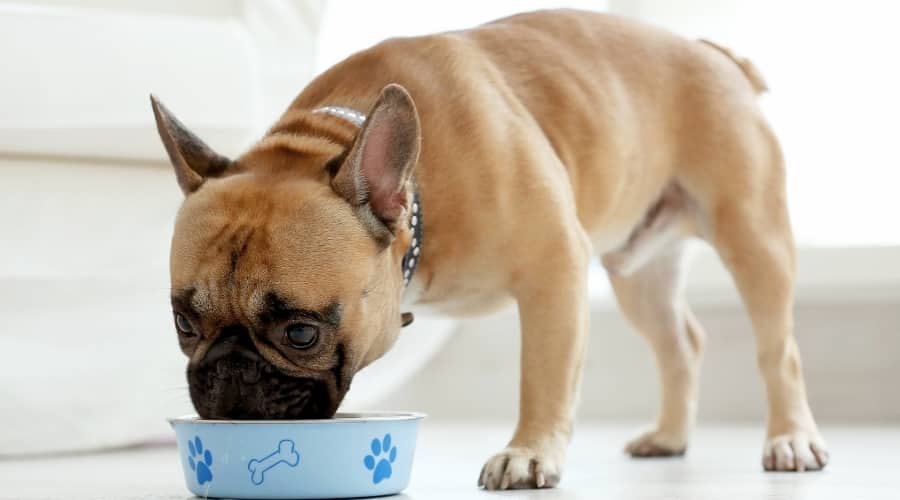
Adult dog food and puppy food are not formulated the same because adult dogs and puppies have different nutritional needs. Puppies need more calories, fat, protein, and minerals than adult dogs to support their rapid growth.
Adult dogs can overheat and have too many calories, while puppies fed adult dog chow too early are at risk for nutritional and developmental deficiencies. It is important to feed dogs the correct puppy or adult formulated food. Puppies who eat adult dog food will lack calories, protein, and fats and can suffer from slow growth and poor development.
Puppies need about twice the amount of amino acids that adult dogs. Too little of these essential ingredients for their growth can lead to poor development and growth delays. Puppy chow is higher in fats because fats help support the rapid growth puppies experience. This level of fat for adult dogs will quickly cause unhealthy weight gain.
Adult dogs need fewer calories than puppies and less protein. Adult formulated dog food usually has more filler ingredients than puppy formulated chow. The Association of American Feed Control Officials (AAFCO) provides regulations and guidelines for dog food. Their standards are as follows*:
- Arginine – 0.62 for puppies and 0.51 for adults
- Protein – 22% for puppies and 18% for adult dogs
- Fat – 8% for puppies and 5% for adults
- Calcium – 1% for puppies and 0.6% for adult dogs
- Phosphorus – 0.8% for puppies and 0.5% for adult dogs
- Sodium – 0.3% for puppies and 0.06% for adult dogs
- Lysine – 0.77% for puppies and 0.63% for adults
- Leucine 0.72 % for puppies and 0.59 for adults
- Chloride – 0.45 % puppy 0.095 for adults
- (*This is not a complete list)
About 25 to 30 calories per pound is a good rule for your Frenchie, though this can be hard to control. Adult Frenchies need about 500 to 750 calories a day. Older dogs need much fewer calories, between 400 and 600 calories a day. Check out some of our reviews of the best dog foods for French Bulldogs right here.
Importance Of High-Quality Dog Food
It can seem like a good idea to save a few bucks and get a generic or budget brand of dog food. This can be a risky choice for your French Bulldog’s health. She needs top-quality, well-balanced nutrition. Cheaper brands tend to be of inferior quality, with many filler ingredients, preservatives, and artificial colors. These added ingredients have no nutritional value. Low-quality foods are also often low in minerals like omega fatty acids and protein.
Foods with a lot of wheat products should be avoided. These can cause gas in Frenchies because they are hard to digest. Try to avoid foods with lots of fillers, elevated levels of protein, and those that use wheat and corn. Corn can cause a lot of trouble for Frenchies, including irritated skin and hives.
At A Glance: Our Top Picks For French Bulldog Food
| Puppies | Adults | Seniors | Allergies |
|---|---|---|---|
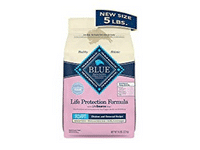 | 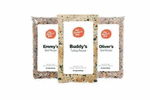 | 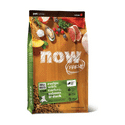 | 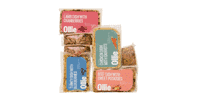 |
| Blue Buffalo Small Breed Puppy | The Farmer’s Dog | Now Fresh Small Breed Senior | Ollie Lamb Recipe |
| View on Amazon | Visit Website | View on Amazon | Visit Website |
| Read Review | Read Review | Read Review | Read Review |
Why Is Small Breed Puppy Food Important?
Small breed food is essential for many reasons. Larger dogs need a different nutrient, vitamin, mineral, and calorie mix than small dogs. Large breed formulas can be higher in fat and protein, which can be too much for a smaller dog like the Frenchie.
What Nutrients Do French Bulldog Puppies Need?
French Bulldogs need various nutrients, vitamins, and minerals from their food. Here is a quick breakdown:
Protein
Protein is an essential part of a dog’s nutrition. It supports growth and development and provides energy to a dog throughout her life. Animal-based protein is best. Fish, chicken, turkey, eggs, lamb, and beef are good choices. It is healthy and provides your dog with some variety to offer different animal proteins and change their flavors while sticking with the same brand of food. Chicken is an excellent source of protein for Frenchie puppies.
Glucosamine
Glucosamine is a compound found in cartilage often found in seafood, fish, and chicken. This nutrient helps develop healthy, strong bones, joints, and muscles.
Carbohydrates
Carbohydrates come from plants and grains. They play an essential role in many of the canine body processes. Rice is a good carb for Frenchies. Carbs provide energy to your dog. Sugars are carbohydrates that turn into energy. Fiber is a carbohydrate that is very important to digestive health in canines. Fiber helps Frenchies regulate their digestive systems. It helps keep bowel movements healthy.
Fiber is low-calorie and is found in many fruits and vegetables. Spinach, green beans, apples, sweet potatoes, carrots, and strawberries are examples of healthy fiber sources for Frenchies. Stay away from onions, garlic, avocados, lemons, tomatoes, grapes, cherries, raisins, and chocolate. Also, avoid feeding Frenchies wheat, corn, and gluten.
Omega Fatty Acids
Omega fatty acids are vital for healthy puppy development. Healthy fats support skin and coat health. They also play a role in brain development, eye health, and overall health. Fish, fish oils, meat, and the amino acid DHA are essential for brain development. This will help with mental development and improve coat and skin health. Frenchies are known for poor skin health, so omega fatty acids are especially important for this breed.
Vitamins & Minerals
Vitamins A and E, in particular, are excellent for French Bulldogs. They are prone to cherry eye and other eye ailments. Vitamin A can help prevent these conditions and promote eye health. Calcium is essential for bone health. However, too much calcium can cause issues with joint formation—too little calcium results in weak bones and joints.
How Much Do French Bulldog Puppies Grow Each Week?
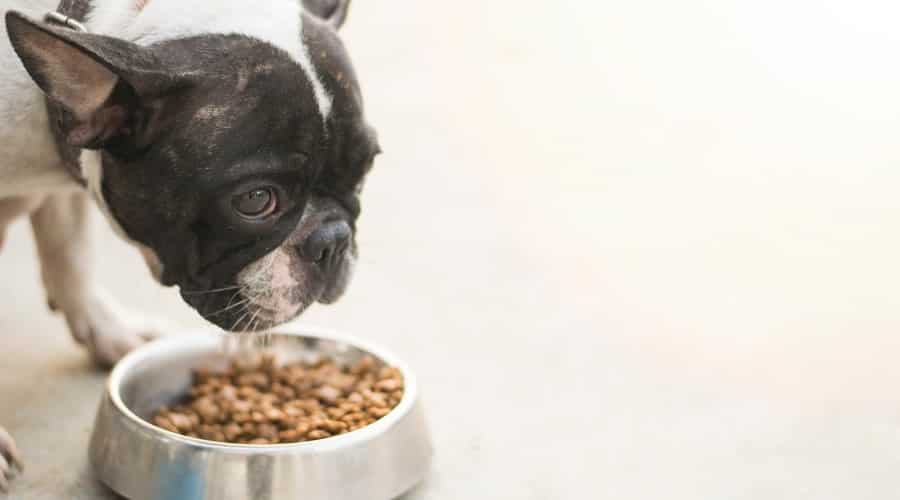
Some weeks will see rapid growth spurts, while others may not see much change. This is normal. They will grow slowly at first, just a few ounces, then about a half-pound a week. They will start to gain about a pound a week until six months old, when growth will slow. By 10 to 12 months, they will be close to fully grown.
This is a guideline of what to expect, not an exact prediction. Your dog’s growth will vary depending on their size, gender, and lifestyle. Males tend to be larger. Growth spurts and delays happen and are normal parts of puppy growth. If you are concerned about your Frenchie’s development, check with your veterinarian to ensure she is on the right track.
Keeping Your French Bulldog At The Right Weight
It can be a challenge to keep your Frenchie at the right weight. As a puppy, she will be hungry all the time and may try to find extra food. People’s food is very tempting, and dogs are very clever at finding scraps. Not feeding your Frenchie people snacks is key to keeping her healthy and at a healthy weight.
Owners must monitor meal times and ensure that kids and guests are not feeding their dogs tasty treats under the table. It may seem fun and nice, but it is unhealthy for your pup. Human meals are often high in fats, salts, additives, and chemicals that can be hard to digest or even toxic to canines. These can also be hard to digest, causing GI tract issues and promoting obesity.
Frenchies should not weigh more than 28 pounds fully grown. Males are larger, and females weigh 17 to 24 pounds. High-quality chow, a well-balanced diet, regular medical care, and daily exercise are all factors in keeping a Frenchie at a healthy weight. Monitor your dog’s feeding and how much they eat, and keep pets in a separate area during human mealtimes to discourage snacking or begging for fat-laden treats.
Frequently Asked Questions
How many times a day should I feed a French Bulldog?
Feed a Frenchie puppy four times a day. Gradually decrease this to 3 times a day around three months old. At 6 to 8 months, you can switch to twice a day if desired. Adult dogs should be fed twice a day. Senior dogs may eat once or twice a day, sometimes three. This depends on the individual dog.
Should I feed my French Bulldog a raw diet?
Some breeders feed their dogs and puppies raw diets. There can be some benefits to raw diets, including coat health, dental health, digestive regularity, and more energy. Many people feel these diets are cleaner for dogs. Rough food diets are too rich for puppies and will not provide proper nutritional balance. You should only feed your adult French Bulldog a raw diet under the guidance of your veterinarian. Raw food requires an extremely high level of sanitation and handling and may not be appropriate for homes with lots of other animals or small children.
Why won’t my French Bulldog eat?
There are several reasons why your Frenchie might not want to eat. She may simply not like the kibble you are offering her. She may be having an off day and just not feel hungry. Refusing to eat for more than a day or two is the cause for a call to the veterinarian for advice. Your dog may be experiencing gastrointestinal distress, a stomach virus, or some other underlying medical condition that may affect her appetite.
Can French Bulldogs eat ice cream?
French Bulldogs should not be fed ice cream meant for human consumption. It is commonly made of cow’s milk, which dogs have difficulty digesting. Too much of it can cause stomach pain, diarrhea, and indigestion. Ice cream tends to be high in fat and sugar content and has lots of additives and artificial ingredients, which are not healthy for canines.
Some preservatives and additives in ice cream can even be toxic to dogs. Even a little ice cream can cause vomiting, diarrhea, gas, and bloating. Smaller dogs are also at an elevated risk of getting sick from ingesting too much dairy because of their small size and sensitive digestive systems. Frozen treats made specifically for canine consumption should be safe. Make sure to always read the labels on these products to ensure what you are feeding your dog is safe.
How can I stop my French Bulldog from eating poop?
As unsettling as this behavior is, it is actually quite normal for dogs, especially puppies. In adults, this can be the behavior they employ to keep their area clean. Frenchies do tend to have this habit. Most French Bulldogs will outgrow this behavior by the time they reach a year old. There are a few steps owners can take to discourage this behavior. The first is to pick up dog waste as soon as they are done using the bathroom. This will eliminate the problem.
Do not let your dog be outside unsupervised. Make sure your pup has enough exercise, opportunities for play, and interactions with humans. You can discuss this behavior with your veterinarian and consider switching your dog to a new kibble. Try to eliminate any stressors and keep their routine as regular as possible. If this behavior persists, consult your veterinarian and professional dog trainer on the next steps to discourage them from this unappealing habit. Learn more about this stinky habit here.
Final Thoughts
Bringing home a new Frenchie puppy will be one of the happiest experiences of any pet owner’s life. These sweet pups are adorable, intelligent, and cuddly and make wonderful canine additions to any family. They will need a lot of love and care and a responsible owner who provides top-notch nutrition from puppyhood through their senior years. Our French Bulldog feeding chart and guidelines are a good reference point for owners looking for information about feeding their new puppy. Remember that these are guidelines, not precise predictions for every dog.
Taking care of a Frenchie at any age is a beautiful experience and a big responsibility. Remember always to buy top-quality dog chow and communicate with your veterinarian about any significant changes in your dog’s eating habits or diet. Never make substantial changes suddenly, and pay attention to how your dog responds to different foods. Her nutritional needs will change as she grows from a newborn puppy to an adult dog. With an attentive owner and a diet that meets all their nutritional needs, French Bulldogs will grow into healthy dogs who live long, happy lives.
